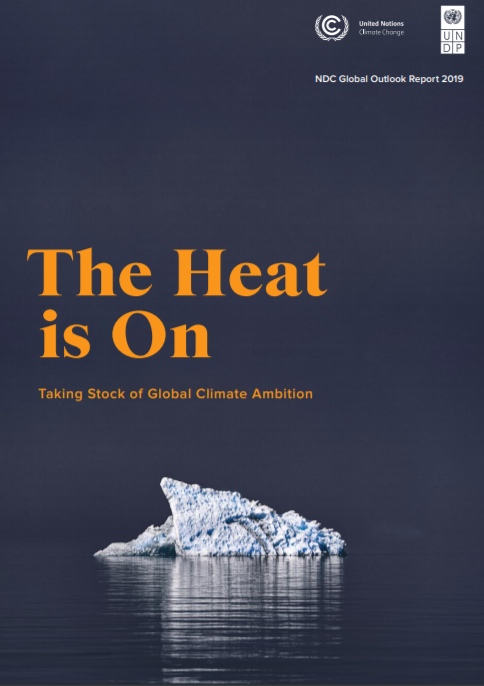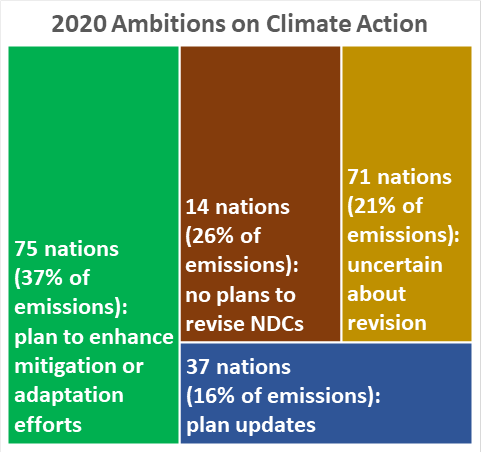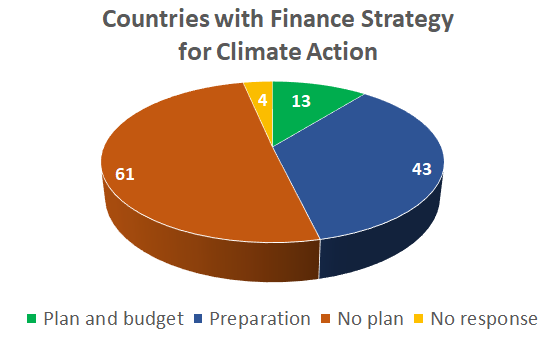The UN Measures Efforts on Climate Action
The UN Measures Efforts on Climate Action
 Read “The Heat Is On: Taking Stock of Global Climate Ambition” from the UN Development Program and UN Climate Change.
Read “The Heat Is On: Taking Stock of Global Climate Ambition” from the UN Development Program and UN Climate Change.
The report warns about the dangers of climate change before 2050, and the tone optimistic, praising countries for what they are doing rather than shaming the laggards. "Overall, this report finds many reasons for optimism, but much work remains. It’s clear that business as usual simply isn’t good enough anymore."
Near Universal Approval
“With 197 Parties, the United Nations Framework Convention on Climate Change (UNFCCC) has near universal membership and is the parent treaty of the 2015 Paris Climate Change Agreement. The main aim of the Paris Agreement is to keep a global average temperature rise this century well below 2 degrees Celsius and to drive efforts to limit the temperature increase even further to 1.5 degrees Celsius above pre-industrial levels.”
Challenges
“Lack of awareness about climate change and unreliable data were identified as the main bottlenecks for mobilizing society identified in developing countries. However, a growing youth climate movement that includes millions of children in protests, inspired by teen activists such as Greta Thunberg and Jamie Margolin, is now adding pressure for action in 2020 by demanding system change from world leaders and more accountability from carbon-intensive industries.”
“At least 112 nations, representing 53 percent of global GHG emissions and including many of the developing countries that are the most vulnerable to climate change, have indicated they intend to revise their plans for fighting global warming in 2020. Within this group, 75 countries, representing 37 percent of global GHG emissions, are leading the way with intentions to enhance ambition in their next NDCs –either by curbing GHG emissions, or including measures to make societies more resilient to the worsening impacts of climate change, or both.”

Good Economic Sense
"Countries see value in integrating [Long-Term Strategies] within long-term development planning."
Sustainable Development
“Governments increasingly recognize that action to address climate change is inseparable from delivering the Sustainable Development Goals (SDGs) to eradicate poverty and hunger and reduce inequality, according to the joint analysis. Climate change is already disrupting national economies and affecting lives, with a disproportionate impact on the poor, and prioritising adaptation to climate change is increasingly seen as critical for resilient sustainable development.”
Multi-Prong Efforts
“Since 2015, the private sector, cities, regions, investors, civil society and other stakeholders have all become more involved in solutions to climate change. However, far more action is needed if we are to achieve the 1.5°C goal. Reported bottlenecks to NDC implementation include challenges of assessing the costs of different options and accessing finance, limited institutional capacity or lack of engagement by key ministries, limited access to reliable data, and lack of political will.”

(Data source: “The Heat Is On: Taking Stock of Global Climate Ambition”)